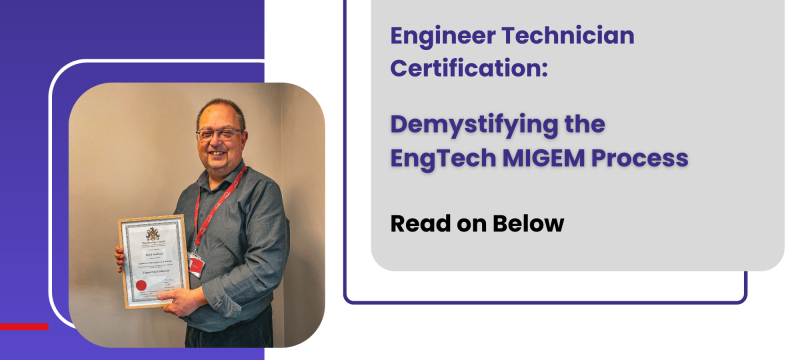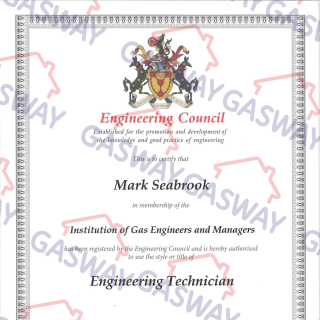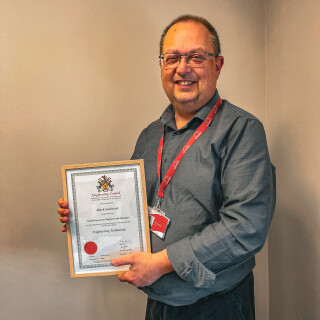Engineer Technician Certification: Demystifying the EngTech MIGEM Process

Embarking on the journey towards becoming an Engineering Technician (EngTech) within the gas industry is akin to navigating uncharted waters, where each milestone is a testament to one's expertise, dedication, and adaptability. Recently, Gasway's Head of Compliance, Mark Seabrook, undertook this transformative process, immersing himself in the nuanced journey towards EngTech accreditation. In this insightful overview, Mark shares his firsthand experiences, shedding light on the complexities and intricacies inherent in this professional advancement. Join us as we unravel the narrative of Mark's journey, offering valuable insights into the rigorous path towards EngTech accreditation within the dynamic realm of the gas industry.
An involved & extended qualification
This qualification is an involved and extended process based on your knowledge, experience and continued professional development. I'll be honest and say that I hadn't considered it much. Everyone involved in the Gas Industry is aware of IGEM (Institute of Gas Engineers and Managers) as they produce many technical documents used in the Gas Industry, both upstream (before the meter, Gas Mains, etc.) and downstream (after the meter, pipework, boilers, cookers, etc.). As the Largest Heating Company in the East of England, Gasway sits on the Large Business Forum (LBF) where we meet bi-monthly to discuss industry issues and comment on the latest standards and regulations.
While representing Gasway at one of these meetings, I was asked if I was an Engineering Technician (EngTech.). I mentioned that I was registered with IGEM as a Gas Technician only. Surprisingly, they reacted by acknowledging that not many people had my breadth of experience in the gas industry, considering my work from extracting gas on rigs in the North Sea to installing and maintaining gas-burning appliances. Coupled with running businesses independently, teaching gas engineering in both Further Education and Private Training establishments, and being responsible for onsite apprentices' assessment, they believed I was well-placed to apply for EngTech registration
A not so simple five-step process

Once I decided to apply, I received my application pack, which clarified that the process was not as straightforward as it seemed. There are seven areas where competence must be demonstrated, all of which must be evidenced. These areas include:
- Using engineering knowledge and understanding to apply technical and practical skills.
- Contributing to the design, development, manufacture, etc., in the gas industry.
- Accepting and exercising personal responsibility.
- Using effective communication and interpersonal skills.
- Making a personal commitment to an appropriate code of professional conduct.
Each area is further divided into subsections, all requiring supporting evidence submitted to a committee, who scrutinize the response and may request more information or evidence as needed. The application form itself spans eleven pages.
The standard they're looking for is detailed in the application as follows:
"An Engineering Technician will demonstrate competence in all listed areas, with the depth and extent varying with the role. They'll exhibit a level of competence and commitment consistent with their specific role. Although they may have limited experience in some areas, they need to demonstrate understanding and familiarity with key aspects of competence. They'll show an appropriate balance of competences to perform their role effectively at the Engineering Technician level."
While not officially listed as a requirement, I underwent an informal interview with Senior members of IGEM during another LBF meeting. Here, they asked me to elaborate on some points of my work history, particularly in areas where they had little experience (offshore areas, specifically in this case, and my work at Bacton Gas Terminal).
Maintaining and improving skills

Once all this is completed and submitted, there's a three-month quiet period before receiving an email confirming success, followed by a thick envelope containing a certificate from the Engineering Council and a notice that the yearly subscription has increased (as nothing is free).
I'm proud to have been accepted by the Engineering Council as an Engineering Technician and would like to thank Gasway for their support with my application. I believe it's important to stay at the forefront of development within the heating industry by working closely with IGEM. As a result, I now have the opportunity to sit on the Standards Review Committee in the future. We've also registered our Team of Auditors as Gas Technicians to help maintain and improve the skills and standards of the Gasway workforce.

Mark Seabrook - Head of Technical Compliance:
Engineer Technician Certification: Demystifying the EngTech MIGEM Process; (11th April 2024)
Mark has dedicated his career to the heating industry since his apprenticeship in 1986. He's mastered domestic and commercial systems. Transitioning to teaching in 2010, he nurtured future engineers while pursuing qualifications himself.
Now Head of Technical Compliance at Gasway, he's earned the EngTech MIGEM title and advises industry standards bodies. With 31 years of marriage, coastal living, 3 dogs, a horse, and a passion for golf and karate, Mark is one of many industry experts at Gasway Services LTD.

